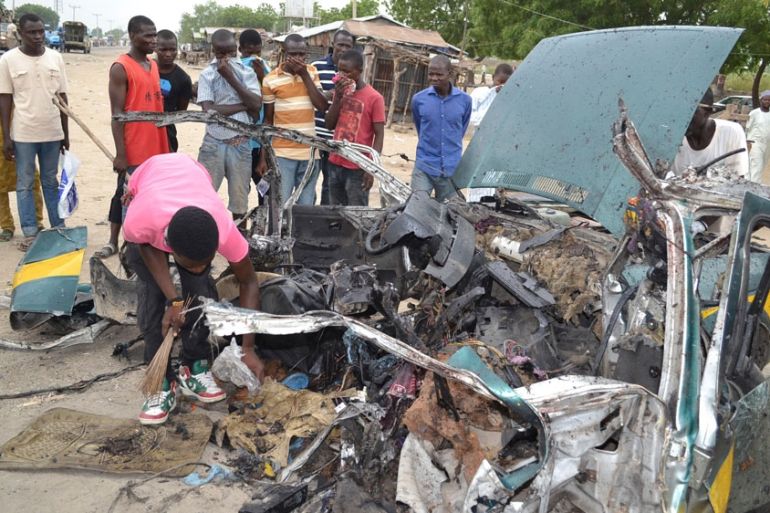UNICEF: Boko Haram use of child bombers soars
At least 83 children, mostly girls, used by the armed group in suicide attacks this year, says the UN agency.

The number of children, mainly girls, used by the Nigerian armed group Boko Haram as “human bombs” has quadrupled this year, according to UNICEF.
The UN’s children agency said on Tuesday that since January 1, 2017, 83 children have been used by the group to carry out bomb attacks in north-eastern Nigeria – four times higher than it was for the entirety of 2016.
Keep reading
list of 4 itemsTen years after ‘Bring Back Our Girls,’ Nigeria’s kidnappings continue
Why mass kidnappings still plague Nigeria a decade after Chibok abductions
Children kidnapped in northern Nigeria have been freed
The body said 55 of them were girls, most often under the age of 15. Twenty-seven were boys, and one was a baby strapped to a girl.
“UNICEF is extremely concerned about an appalling increase in the cruel and calculated use of children, especially girls, as ‘human bombs’ in northeast Nigeria,” the agency said. “The use of children in this way is an atrocity.”
READ MORE: ‘Alarming’ rise in Boko Haram child suicide bombers
UNICEF said that Boko Haram, whose name roughly translates to “Western education is forbidden”, has sometimes, but not always, claimed responsibility for these attacks.
The UN body did not give an explanation for the rise in numbers.
“We feel this is just the way Boko Haram terrorises women and children in the community,” Milen Kidane, UNICEF’s chief of child protection, told Al Jazeera from Nigeria’s capital, Abuja.
Hafsat Muhammed, a Nigerian rights activist and journalist, said the actual number of children used by the armed group is even higher.
“The conflict has reached to a stage that these insurgents are diverting attention by using children,” she told Al Jazeera.
READ MORE: One million forced from school by Boko Haram war
Muhammed said that armed groups like Boko Haram give children a sense of belonging in a society where they do not have the basic necessities.
“Children tend to fall into the hands of Boko Haram, who would then reign over them and use them, just because they feel that they belong and they have persuaded them that maybe this is the cause of life,” she explained.
‘Rise up against atrocities’
The UN estimates that 20,000 people have been killed and at least 1.7 million displaced since the armed group launched its armed campaign in northeast Nigeria eight years ago.
The violence has also spread to neighbouring countries, leading to the closure of more than 2,000 schools in Nigeria, Chad, Niger and Cameroon, according to a 2015 UNICEF report.
|
|
Hundreds of others have been attacked, looted or burned by Boko Haram, while an estimated one million children have been forced out of school as a result of violent attacks in northeastern Nigeria and its neighbouring countries.
In its statement on Tuesday, UNICEF said that the attacks have led to children who escape or are released by Boko Haram being viewed with suspicion and rejected by their communities.
The violence and security situation in the region has also forced thousands of parents not to send their children to schools.
“I think the society needs to own up to its irresponsibilities of not catering for its children and rise up against such atrocities,” Muhammed said.
UNICEF’s Kidane offered optimism that efforts are being made to put an end to the crisis.
“We are seeing a lot of collaboration with the military in Nigeria,” she said. “Work is being done so that the release of these children is done as quickly as possible while maintaining their human dignity.”
Additonal reporting by Saba Aziz: @saba_aziz